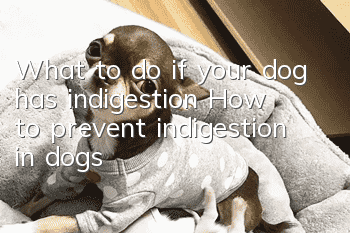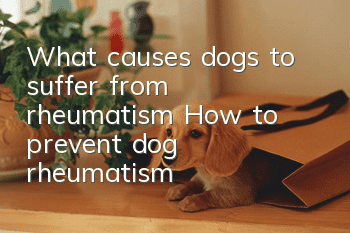What to do if your dog has indigestion? How to prevent indigestion in dogs?

Eating too much and being unable to digest it is also a common problem among dog owners. People who eat too much will take medicine to promote digestion to relieve this discomfort, but what should a dog do if it cannot digest after eating too much?
What to do if your dog has indigestion?
1. Relieve the dog’s gastrointestinal tract and relieve the digestive pressure on the gastrointestinal tract. After the dog eats too much, you can temporarily stop eating and give it a period of time to slowly digest the food in its gastrointestinal tract.
2. During the period when the dog’s digestion is slow, do not immediately feed other meats and indigestible foods, but feed liquid foods such as vegetable soup and side dishes.
3. Reduce the burden on the gastrointestinal tract by feeding again. In the subsequent feeding process, you can prepare more food rich in dietary fiber.
4. Help dog digestion and gastrointestinal motility. Be careful with rough grain mixes. You can prepare rice, noodles, corn, sweet potatoes, celery, carrots, cabbage, cooked meat, bone broth, etc.
5. By combining food reasonably, it can not only meet the dog's physical needs, but also reduce the burden on the gastrointestinal tract. In case of severe gastrointestinal indigestion in dogs, in case they feel nauseated.
6. You can also take drugs to promote digestion, improve local anorexia, promote digestion and absorption, eliminate bad breath and odor in stool, which are indispensable in daily digestion.
How to prevent indigestion in dogs?
Preventing indigestion in pet dogs is the responsibility of every pet owner. When a dog becomes an adult, the growth rate of various tissues and organs in the body changes from the high-speed growth in the puppy stage to gradually slowing down until it stops. The amount of adult dog food you should feed should depend on your dog's size and daily energy expenditure.
Adult dogs in a special physiological stage will also have corresponding changes in their food digestion and absorption and nutritional needs.
(1) Pregnant female dogs: Due to the needs of embryonic development, the feeding amount and nutritional level of food can be appropriately increased. Moreover, the female dog’s stomach cannot relax normally because the uterus takes up a lot of space in the abdomen. Therefore, it is best to eat smaller meals more frequently to improve the palatability of food.
(2) Lactating female dogs: Not only must they meet their own nutritional needs, but they must also ensure lactation needs. The demand for nutrients and energy will suddenly increase. Therefore, during this period, it is necessary to provide the female dog with high-energy, nutritious and delicious food, and increase the amount of food.
(3) Aging dogs: When dogs get older, due to the reduction in activity, some physiological changes occur in the body that affect the metabolic rate. The demand for energy naturally decreases, and the digestion and absorption of food by the digestive organs decreases.As the ability to absorb is weakened, the food fed to elderly dogs should be of good quality, nutritious, and easy to chew. It is best to make the food semi-liquid.
(4) Sick dogs: Due to the disease, the appetite has decreased, so they should eat less and more frequently, and provide them with food that has a special fragrance, good palatability, and is easy to digest and absorb.
- Why do dogs have diarrhea in summer?
- How to take care of a newborn puppy
- How to treat canine parvovirus, treatment methods and precautions for canine parvovirus!
- Common causes of bloody stools in Shiba Inu dogs
- How many roundworms does a puppy usually have?
- What to do if the puppy’s butt is blocked by feces?
- How to wean a dog from breastfeeding?
- Labrador dog training methods, have you learned it?
- Introduction to dog strength training methods
- What to do if your dog accidentally eats chocolate?



